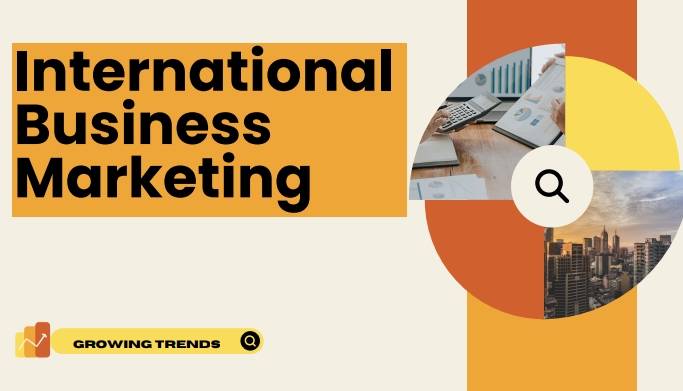Almost every entrepreneur and even big businesses have been at that point where they hit a wall when trying to break into a new demographic. Most people think the problem lies in their product or even their employees, but that’s hardly the case. The issue often stems from their marketing strategies. This is because the marketing tactics used at home are usually not the same ones that resonate with people from other demographics.
Let’s use a scenario to explain this: a skincare company in the U.S. usually focuses on minimalistic branding and achieves a high degree of success there. However, if they try to expand to South Korea, a country famed for its beauty business, their growth will be extremely slow. South Korean consumers tend to prefer multi-step skincare regimens, trend-driven ingredients, and thorough product descriptions. So, the U.S.-based company that relies on minimalism will find it very difficult to break into that market.
This is why understanding trends in international business marketing is so important—it helps businesses identify what’s trending in a particular demographic. Today’s article is a guide to the top trends in international business marketing you need to know, along with tips on how best to implement them.
Table of contents
What Are Trends in International Business Marketing

Business marketing trends are the broader changes or developments that influence marketing strategies. This can happen through technological advancement, changing the preferences of the customers, or alteration in society’s behavior.
By being updated with the changing trends, organizations can update their marketing strategy to suit demand and keep their relevance intact in the competitive market. By understanding marketing trends, businesses can also grasp opportunities for innovation and growth, helping them reach out to their target audience and expand their presence.
Implementing current marketing trends is necessary if an organization wants to prosper and gain a competitive advantage. Normally, such trends focus on areas of technological advancement, customer engagement, usage of social media platforms, and increasing emphasis on privacy.
Companies paying attention to these areas can come up with better marketing campaigns and develop better relationships with their customers. These will, in turn, increase a company’s capability to satisfy the customer’s needs in the long run and form a sound base for sustainability and long-term success.
You should read: 5 Australian Companies That Sponsor Work Visas
Why is it Important to Be Updated on Trends in International Business Marketing?

Maintaining Competitiveness
The uniqueness of a company from its competitors allows firms to catch the attention of consumers and market share amidst the growing competitive economy.
The key is understanding digital marketing trends, which allows businesses to discover new techniques and technologies that will help them compete. Whether through the latest social media platforms, new SEO strategies, or innovative content formats, being current is key to staying ahead.
You should read: Best Resume Objective Examples to Help You Stand Out
Maximizing Return on Investment
Marketing trends are about optimizing efficiency and effectiveness. New technologies from automation to data analytics platforms; enable businesses to economize processes, reach their audience with greater precision, and measure campaign performance more accurately.
Companies will be able to integrate these trends into their strategies for maximum return on investment and hence acquire better results.
Future Proofing Your Business
Marketing trends are one field that keeps on changing with the coming of new technologies and trends. It will allow a company to have proactive and flexible plans for any disruption that might happen in the future while emerging opportunities are capitalized upon.
Be it voice search gaining prominence, augmented reality influencing the customers’ world, or sustainability gaining more importance in marketing, staying ahead of the curve allows a business the ability to look ahead and prepare for tomorrow.
You should read: Best College Degrees That Guarantee a Job After Graduation
Meeting Consumer Expectations
Today’s consumers have a continuous change in interest. They want businesses to offer them experiences that feel personal and specific to their needs. They prefer smooth and easy interactions with either a website, app, or social media, and the content should be in line with their interests and preferences.
When companies implement the latest marketing trends, understanding these changing customer expectations becomes even more clear. Therefore creating much better experiences for customers, it will make them happier and more loyal to the brand in the long run.
You should read: How To Create a Winning Customer Service Resume
Top Trends in International Business Marketing

#1. Localization is a Must
According to a 2014 report, 75% of consumers have said they’re likely to purchase goods and services if the product information is in their native language. Furthermore, a staggering 87% of buyers who cannot speak and can’t read in English would not even think about buying from an English website.
Look at it this way: when you happen to travel to some other country, you will possibly blend in with them and end up building long-lasting relationships with locals if you communicate in their dialect and are known to their cultures and traditions.
It can be hard to satisfy your customers’ demands when you bring your goods or services to another nation, especially if they are unfamiliar with your content and method of distribution. Your international clients should receive the same level of service as they would from a local company due to localization strategies.
It refers to the tailoring of content to satisfy the needs of a certain audience. It is the change you make to your content to meet the specific needs of your new market.
Tips on How to Approach Localisation
- Outsource Local Experts: Employ sourcing experts who know the culture of the regions, their language, and trends.
- Do Your Homework: Invest your time in learning about the cultural practices of your target market, their psychological makeup, and what drives them to buy.
- Test Your Messaging: This means conducting focus groups or test campaigns to ensure the public you want to reach hears your message.
Nowadays, localization is an absolute necessity without which your business seems tone-deaf or worse still—insensitive.
You should read: Best Sign Language Courses For Beginners And Experts
#2. Influencer Marketing
“Ask a local.” You’ve probably heard this frequently when you’re planning to travel and want to have a great and authentic experience. It makes sense. Locals know the area. They know the culture.
They know what works. Collaborating with influencers can give you the power and foothold you need to enter new markets and broaden the worldwide impact of your company.
Influencers are in a prime position to link companies with consumers in their new markets, particularly those with high rates of internet and mobile device usage. For instance, Brazil, Mexico, and Argentina are among the top internet-using countries in the globe. Influencer marketing is one of the top trends in international business marketing.
In the past, businesses may have hired a local middleman or a staff member to serve as a kind of “translator” between their home nation and the new market, promoting their products in a way that is appropriate for the dynamics and culture of the new area.
In addition to ensuring that companies were localizing their efforts and paying attention to regional preferences and cultural differences, this individual or organization would be in charge of establishing connections and fostering relationships.
Tips on How to Use Influencer Marketing
- Choose the Right Influencers: Do not look at the number of followers but examine the engagement rating and identify the target group.
- Set Clear Goals: Whether it is brand building, new customer sales, or changing perception about products, define this upfront.
- Adapt Content: Make sure it follows your brand’s aesthetic and that of the country you operate in.
When done strategically, integrating influencer marketing into your international business marketing strategy can provide your brand with legitimacy and audiences that cannot be attained through typical advertisements.
You should read:Marketing Internship 2025: How to Apply, Requirements, and Tips
#3. Sustainability Marketing
The concept of sustainable marketing is a strategy that involves product development and promotion, services, and initiatives in an environmentally and socially responsible manner, considering mainly the long-term impacts of the business’s actions on the planet and society.
A company that practices sustainable marketing tries to achieve all its business objectives while leaving a positive mark in the world and offering what customers desire. Sustainable practices aren’t only important because they’re ethical — they’re also in demand.
Assume you’re a team leader at a well-known marketing startup. Every year, your department hosts a successful marketing conference. People travel from all around Europe to attend it.
You usually display enormous promotional posters in local universities and business schools. You also print a huge number of nametags and paper handouts for participants.
This marketing convention may be profitable and popular, but it is certainly not sustainable. A much more sustainable marketing strategy would be to move the conference online using a virtual events solution such as Demio.
That way, you’d cut down on your event’s carbon footprint and wouldn’t have to use single-use handouts and other promotional items. Sustainability marketing is quickly becoming a top trend in international business marketing.
Tips on How to Use Sustainability Marketing
- Be Transparent: Communicate your sustainability efforts through promotional materials, product packaging, and social media.
- Certify Your Claims: You can substantiate your claims with the relevant certifications such as Fair Trade or Carbon Neutral.
- Educate Your Audience: Let them know how your product and services work towards a sustainable tomorrow.
It is not merely a matter of being altruistic; it is also about being viable in a world that has shifted to consider the environment as much as the item purchased.
You should read: The Importance of Mentorship in Career Growths
#4. AI-Driven Personalization in International Business Marketing
AI-powered personalization means leveraging artificial intelligence and machine learning algorithms to crawl through chunks of huge data in order to offer personalized content, recommendations, and experiences at an individual level to the users.
It has a lot of marketing functions, from proposing personalized product recommendations on eCommerce sites, sending personalized email marketing campaigns, to offering personalized content recommendations on social media.
In other words, personal AI desires to be an experience in one-to-one marketing, making customers feel special and understood. (We’re not above this even if we consciously notice it happening. The moment something as simple as an email with our real first names incorporated into the text—proper punctuation, of course—lands in our mailbox, we’re on board reading it.)
Personalization has an impact. Personalized businesses perform better in those activities by 40 percent versus median performers. Across US industries, a shift to top-quartile performance in personalization would generate over $1 trillion in value. Personalization front-runners achieve impact by tailoring offerings and outreach to the right individual at the right moment with the right experiences.
Tips on How to Use AI-Driven Personalization
- Start Small: Al isn’t perfect for everything, but it’s perfect for certain things like email marketing or advertising campaigns.
- Invest in Data: As all Al tools utilized are extremely data-reliant, the more information you have, the more Al outcomes for the company.
- Monitor Results: Like any tool, Al is not always 100% accurate – monitor the results it provides and tactically adjust as needed.
Al is not a technology for large corporations only. It is still a key strategy in any global marketing strategy.
You should read: 32 Best Free Tools for Virtual Assistants
#5. Cross Border E-Commerce: The New Big Trend
E-commerce has been an inevitable part of global retailing in the last few years. Similar to many other sectors, selling and buying goods have seen a lot of change since the advent of the internet, and with ongoing digitization of modern life, consumers across the globe enjoy the edge of web-based transactions.
With more than five billion internet users in the world, the amount of people that will likely shop online is on a steady increase. More than 4.1 trillion U.S. dollars crossed in retail e-commerce in 2024, and this figure will touch new heights in the forthcoming years.
International e-commerce generally refers to selling any kind of product via an e-commerce website to buyers in other nations. Digital technologies are now fast becoming commonplace, meaning that any business can sell online, and international e-commerce is much easier now for both pure-play companies and brick-and-mortar stores.
E-commerce can also be used by traditional merchants to explore the viability of new overseas markets before opening a physical facility there. While it’s easy for e-commerce professionals to believe that expanding into a country with a comparable culture will take less effort, the term “international” is critical.
Tips on How to Use E-Commerce in International Business Marketing
- Optimise for Mobile: In most countries, more than half of all online shoppers use mobile devices.
- Provide Multiple Payment Options: Payment options such as Alipay (available in China) and Paytm (available in India) should be included.
- Ensure Fast Shipping: Select trustworthy logistics providers that can meet delivery criteria.
Cross-border e-commerce holds immense promise for firms who seize the opportunity in the global marketplace.
You should read: How to Know If Your Interview Went Well: Signs You Might Get the Job
Conclusion
International Business marketing is constantly changing and keeping up with the trend is very important. Whether it involves localization, e-commerce, or the use of AI, companies should always stay updated, adjust quickly, and enhance their strategy to any changes.
Before you go, read: Data Analyst Internship 2025: How to Apply, Requirements, and Tips
Frequently Asked Questions
There are at least four kinds of trends that every entrepreneur should be aware of: economic, social, technological, and regulatory.
AI and personalized marketing, further rise of social media short-form video content, and a customer experience-driven approach are the ways in which the face of marketing is changing today.
The future of international business is dynamic, driven by technological change, environmental pressures, and the demand for cross-cultural understanding.
Artificial intelligence (AI) in marketing refers to the practice of using AI methodologies and technologies such as data models, algorithms, and machine learning to provide customer insights that marketers can use to optimize spending, customize content, and personalize the customer journey.
Short-form video is presently the most popular content marketing format, with most marketers claiming it provides a higher ROI than any other format.






